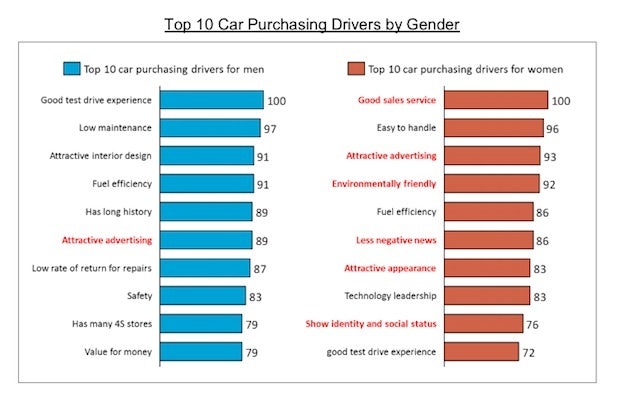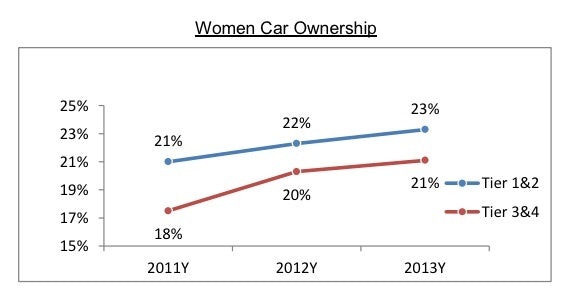
A male BMW owner hired a cow to drag his car around Qingdao to protest poor after-sales service. (China Daily)
Chinese women go with feelings rather than facts much more than Chinese men when buying a car, a new consumer report would have you believe.
A recent survey by GroupM gathered an extensive amount of data from Chinese consumers in first-, second-, third-, and even fourth-tier cities on their purchasing habits of a wide range of products. Jing Daily took a look at the report's luxury segment the other day, but the report asked participants about several other relevant categories, such as automobiles.
According to the results, there are some pretty dramatic differences to be seen between women’s and men’s reasons for buying a car in China. For men, a good test drive experience ranked as the number 1 deciding factor, while it was last on the list for women, who chose good customer service as their top reason. The report takes the time to point out which choices are “emotional,” arguing that six of the top 10 reasons for women are feelings-based, while only one falls in the category for men.

The survey results are likely to prove useful for car companies when planning out their business strategies. However, the designation that women are more “emotional” is highly questionable given the factors that the authors deem to be in the “emotional” category. In the chart above, “emotional” factors are highlighted in red. If you stop and think about the items, some of the designations make no sense. While “attractive advertising” and “show identity and social status” could certainly be considered “emotional” categories, it is not clear why “attractive appearance” is considered “emotional” for women while “attractive interior design” is not categorized as such for men. The reason “has long history” is not considered emotional for men, despite the fact that a car’s history and brand heritage are key components of advertising and often invoke emotions such as nostalgia, as well as influence conceptions of the social status of the vehicle.
Furthermore, it makes no sense that requiring good sales service is necessarily emotional—the report doesn't specify whether this includes after-sales service, which is a huge practical consideration in case there is something wrong with the car. In fact, there’s even anecdotal evidence that after-sales service may be more important with male luxury car buyers, since China has seen multiple recent instances of (very emotional) males smashing their vehicles (and, inexplicably, hooking one up to a cow) in public to protest poor after-sales service—not necessarily a factor that makes men seem like the more practical buyers.
The category of “less negative news” for women isn’t necessarily emotional either—with a spate of car recalls in China over the past year, it certainly makes practical sense that they don’t want a car that will malfunction or be recalled. The similar “safety” categorization on the male side is designated as non-emotional, in contrast.
The final questionable category that is described as “emotional” for women is “environmentally friendly,” which factors fourth on their list but doesn't rank at all for men. Anyone who has lived in Beijing knows that the problem of smog is far from an abstract notion, and it makes no sense that taking personal responsibility for pollution should necessarily be categorized as “emotional,” even if its individual effects are minor without widespread participation.
However, with the rising rate of female car owners across all city tiers, it makes sense to study their buying habits and for car companies to understand the demographics of their customer base. It probably pays for car companies to take a closer look at the reasons behind each factor before embarking on an emotion-based ad campaign, however.

To access more research on the luxury industry in China, check out Jing Daily’s reports page.